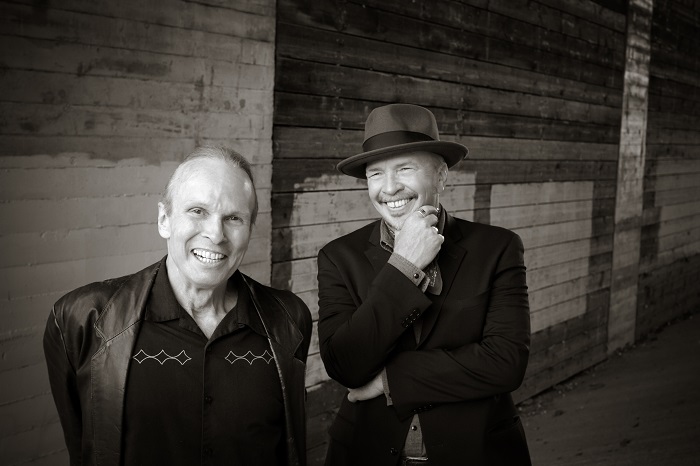
Born two and a half years apart in Downey, California, the Alvin brothers—Phil (March 6, 1953) and Dave (November 11, 1955)—grew up in a music-loving household, listening to all of the country, roots, rockabilly and blues they could get their hands on and attending shows by the likes of T-Bone Walker and Big Joe Turner. Eventually, the brothers decided to make some music of their own, forming the roots rock/R&B outfit the Blasters in 1979. With Phil as the lead singer and Dave as the songwriter and lead guitarist, the band achieved cult acclaim in the LA punk scene and ultimately gained national recognition on the strength of their continuous touring and four studio albums: American Music (1980), The Blasters (1981), Non-Fiction (1983) and Hard Line (1985).
Dave left the Blasters in 1986, and a year later, after a brief stint playing guitar with the alt-rock band, X, he released his first solo record, Romeo’s Escape. Thus began Dave’s prolific and acclaimed solo career, including albums that span genres, from the acoustic country-folk of 1994’s King of California to the electric blues of 2004’s Ashgrove to Public Domain: Songs From the Wild Land, his 2000 collection of traditional folk and blues songs, which won the Grammy for Best Traditional Folk Album. Beyond his diverse talents as a musician, Dave has also seen success as a producer (with the Derailers, Tom Russell and Chris Gaffney), a poet (publishing two books and appearing in several anthologies) and an actor (appearing in films like Border Radio and shows like Justified).
While Dave went solo, older brother Phil continued his work as the frontman of the Blasters (the group disbanded in 1986 and reformed a few years later, without Dave). In 2005, after years of success as a touring act, the Blasters released 4-11-44, their first album since 1985’s Hard Line. In the intervening years, Phil released two solo albums: 1986’s Un “Sung” Stories and 1994’s Country Fair 2000. The Blasters’ latest album, Fun on a Saturday Night, was released in 2012. When not fronting the Blasters, Phil found time to earn a master’s degree in mathematics and artificial intelligence from California State University, Long Beach, where he actually taught math before first finding musical success with the Blasters.
Finally, after nearly three decades, Dave and Phil’s divergent musical paths reunited with the release of Common Ground: Dave Alvin & Phil Alvin Play and Sing the Songs of Big Bill Broonzy, a tribute to the seminal blues legend whom the brothers both cite as a huge influence on their careers. Having recently received a Grammy Nomination for Best Blues Album, it looks like this was a reunion that the brothers—and the rest of us—were more than ready for. “Me and my big brother just went in there and did it,” Dave said. “We just picked up the guitars and counted out the songs, and the record has that kind of energy. It’s the album the Alvin Brothers have been waiting their whole lives to make.”
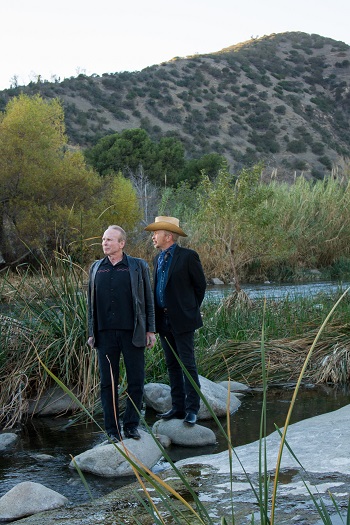
Elmore: What are you listening to right now?
Dave Alvin: An anthology of Kansas City jazz bands from the ’30s.
Phil Alvin: Some young LA guys: the California Feetwarmers, the great fiddle player Frank Fairfield and a guy named Jerron Paxton, also known as Blind Boy Paxton.
EM: What was the first record you ever bought?
Dave: The first album I asked my mom to buy for me was a 45 of “El Paso” by Marty Robbins, with a picture sleeve that had Marty Robbins in a black cowboy hat.
Phil: Maybe Surrealistic Pillow by Jefferson Airplane when I was 14, because I had a girlfriend that liked them, so I bought it for her. But very soon after that I bought Sonny Terry and Brownie McGhee, Sonny Boy Williamson, Chicago/The Blues/Today!, with Junior Wells, and the latest Bill Broonzy album. I pretty much never looked back after that.
I still have a 78 collection, walls of them. Nothing sounds as good as a good 78 on a good 78 player. There’s something really unique that you don’t get on an LP, a CD or iTunes. And those records themselves, they’re works of art, many of them. They should just be on the walls in museums, you know?
EM: What was the first instrument you played?
Dave: I played accordion and harmonica; a guy told me that my hand was too small to play a guitar, and that was a lie. My sister was taking accordion lessons at the time, and it was cheaper to buy an accordion than to rent one—and that accordion is still in our closet. I played flute and saxophone in high school, so those were my first instruments.
Phil: I was six and seven when I played the accordion, and I quit in second grade because I was in a talent contest and the only song that I liked was a song in Book 1 called “Baseball Game”—I liked baseball. [Two other contestants] played a duet—poorly—out of Book 3, and they won. I asked some guys in my class, “How come they won?” And they said, “They were playing out of Book 3 and you were playing out of Book 1.” The music business sometimes just isn’t fair.
EM: What brought you to the instrument you now play?
Dave: When I was about 12, I started playing guitar. We had an older cousin, Mike, and he played banjo and guitar, and I probably bashed on his guitar when no one was looking. The flute and saxophone were like my first instruments, but the first instrument I beat on was a guitar.
Phil: I think I was in sixth grade when I picked up the guitar. But I was playing more harmonica; I really learned how to play guitar to have guys that were accompanying me, on harmonica, play the guitar behind me. It wasn’t really until ninth grade, when I was 14, that I more or less took the guitar a little more seriously. My first guitar was a nylon stringed Orlando.
EM: Who would you like to write with that you haven’t?
Dave: Big question. Terry Allen and Guy Clark. I’ve known Terry for 20-some odd years, and we talk about it but we haven’t done it. When you sit down with another songwriter, you know within about five minutes if you’re going to get something—alright, maybe ten minutes. You kind of have to have similar instincts, or instincts that are so completely different that it works. It’s just chemistry.
Phil: I admire my brother the most. He’s the best songwriter around.
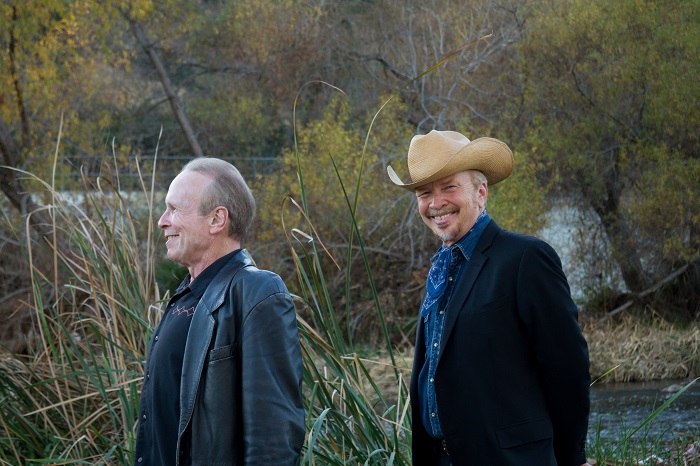
EM: What musician influenced you most?
Dave: Certainly Lee Allen and Big Joe Turner were big influences on me. Those two and Marcus Johnson were big with my brother, Phil—they were, in many ways, larger-than-life figures. There weren’t many people like Big Joe Turner. When you’re 14 years old and you go over to Big Joe Turner’s house in the morning and he’s in his underwear, that will make an impression.
Phil: Big Joe Turner was a good friend of mine, and I certainly imitated his voice. I presume Joe Turner probably influenced me the most.
EM: What was the song or event that made you realize you wanted to be in music?
Dave: I didn’t think about making a living doing music until after Shakin’ Stevens recorded “Marie, Marie” and had a huge hit with that. I got the first royalty check and I was like, Hey, maybe I can take a living doing that!
It wasn’t a Michael Jackson sort of check, but this guy that you’ve never really heard of before covers your song and you just think, Well, whatever…and then you get a check from BMI. For a guy who had never seen a royalty check before, I opened that up and about fainted. I think it was 3,000-and-some bucks, in 1980s money.
Phil: I was teaching math at Long Beach State when the Blasters started, and I intended to pursue mathematics, but the Blasters sort of took off, and that’s when I decided I’d play music for a living. The Blasters were playing on the road, so I just didn’t go back to teach. I didn’t make any plans. I still haven’t made any plans.
EM: What was it like the first time you didn’t have to carry your own bags?
Phil: [laughs] What world do you live in? I brought my own bag to this lousy hotel that I’m staying in. Dave still carries his bags.
Dave: Proudly. It’s nice to be a guerilla musician.
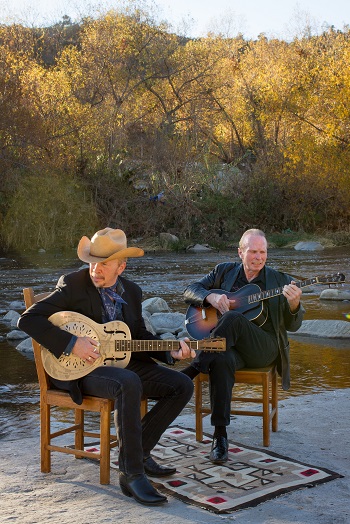
EM: What was the first thing that signaled “success” to you?
Dave: I quit my job working in a Middle Eastern food stand; success meant you could quit those jobs. In 1981, when Time had our first record, on Slash Records, as one of the top ten records of the year. I don’t want to call it validation…Instead of the term “made it,” I would use the phrase, “maybe we don’t suck.”
Phil: When I couldn’t believe the lines that were at the Whiskey and the Hong Kong Bar in LA—we were doing well.
EM: Who would you like in your rock ‘n’ roll heaven band?
Dave: I’d have Otis Spann [piano], Jimmy Rogers [guitar, harmonica], Little Walter [harmonica], Willie Dixon [bass, guitar, vocals, arrangements]—I’d just have the Muddy Waters band from 1951.
Phil: Earl Palmer [drums], Lee Allen [saxophone], Huey “Piano” Smith, “Red” Tyler [saxophone]—I’d put together the Fats Domino band.
EM: What’s your desert island album?
Dave: The best of Jackie Wilson, or the best of Big Bill Broonzy.
Phil: The best of Big Joe Turner, or the best of Sam Cooke.
For the Blasters’ upcoming tour dates, click here.
For Dave Alvin’s upcoming tour dates, click here.


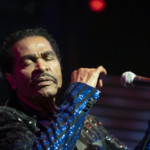
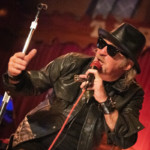
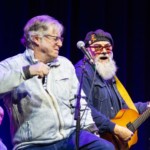

Be the first to comment!